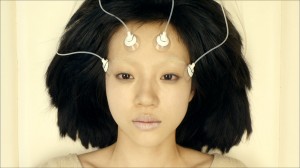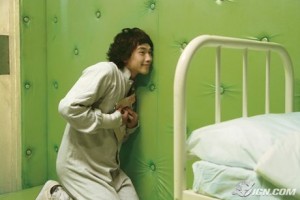I’m a Cyborg, but That’s OK
 Onion AV Club writer Nathan Rabin coined the term manic pixie dream girl to describe that irritating sprite of a character that’s always adorable, energetic, impulsive, and bound to bring a down-on-his-luck, brooding, scruffy, yet good-looking outsider back to the surface so he can discover how wonderful life can be. He was describing Kirsten Dunst’s character in Elizabethtown, but it just as easily fits Natalie Portman in Garden State, Mary Elizabeth Winstead in Scott Pilgrim vs. the World, or Audrey Tautou’s career-defining role as Amelie. The problem with these types of characters is that we never get to see them when the mania ends, nor the consequences of anything they irresponsibly, as the movie ends before we see that.
Onion AV Club writer Nathan Rabin coined the term manic pixie dream girl to describe that irritating sprite of a character that’s always adorable, energetic, impulsive, and bound to bring a down-on-his-luck, brooding, scruffy, yet good-looking outsider back to the surface so he can discover how wonderful life can be. He was describing Kirsten Dunst’s character in Elizabethtown, but it just as easily fits Natalie Portman in Garden State, Mary Elizabeth Winstead in Scott Pilgrim vs. the World, or Audrey Tautou’s career-defining role as Amelie. The problem with these types of characters is that we never get to see them when the mania ends, nor the consequences of anything they irresponsibly, as the movie ends before we see that.
 Chan-wook Park’s I’m a Cyborg, but That’s OK has its bright colors, magical realism, an adorable and anorexic lead, and its whimsical and twee touches blanketing the film. But, unlike Amelie, who would be intolerable as a person and painfully high maintenance outside of the bubble that we’re allowed to see, Su-jeong Lim’s character of Cha Young-goon thinks she’s a cyborg and she’s been institutionalized because of it. Her revenge fantasies and delusion factor into why she’s on death’s door because she believes she can’t eat. Park eschews that hoary cliché of all films taking place in an asylum, where the only sane people are the patients, and the crazy people are the ones on the outside. Nope, the patients are insane in Cyborg, and their quirks would be devastating to deal with if you were a family member or loved one.
Chan-wook Park’s I’m a Cyborg, but That’s OK has its bright colors, magical realism, an adorable and anorexic lead, and its whimsical and twee touches blanketing the film. But, unlike Amelie, who would be intolerable as a person and painfully high maintenance outside of the bubble that we’re allowed to see, Su-jeong Lim’s character of Cha Young-goon thinks she’s a cyborg and she’s been institutionalized because of it. Her revenge fantasies and delusion factor into why she’s on death’s door because she believes she can’t eat. Park eschews that hoary cliché of all films taking place in an asylum, where the only sane people are the patients, and the crazy people are the ones on the outside. Nope, the patients are insane in Cyborg, and their quirks would be devastating to deal with if you were a family member or loved one.
 Playing off his standard themes of isolation (so heavily featured in Oldboy, Sympathy for Mr. Vengeance, Sympathy for Lady Vengeance, Judgment), Park has his characters create imagined conflicts as a coping mechanism, and separating themselves from each other. His casting of Korean pop star Rain is as subversive as if he had cast a Beatles-era Paul McCartney as a serial killer in a slasher movie, but still instructed him to underplay his charms. Rain, who is the love interest for Lim, doesn’t sing in the movie, but he does yodel, and the way that everyone else believes that he is constantly stealing things from them (“how can a person steal Thursday?”) and claims he’s admitted himself into the institution to avoid a lengthy prison sentence, doesn’t automatically establish him as a charming rogue. Rain’s portrayal is just another way that Park’s attitude towards his subject matter, a comedic way of taking things seriously, without lapsing into smarm or outright tragedy. You’re often uneasy watching a Park film, he’s quite the rug puller, but in Cyborg the rug pulling is that we’re aware that these characters have no future in the real world, but we’re happy to pretend along with them.
Playing off his standard themes of isolation (so heavily featured in Oldboy, Sympathy for Mr. Vengeance, Sympathy for Lady Vengeance, Judgment), Park has his characters create imagined conflicts as a coping mechanism, and separating themselves from each other. His casting of Korean pop star Rain is as subversive as if he had cast a Beatles-era Paul McCartney as a serial killer in a slasher movie, but still instructed him to underplay his charms. Rain, who is the love interest for Lim, doesn’t sing in the movie, but he does yodel, and the way that everyone else believes that he is constantly stealing things from them (“how can a person steal Thursday?”) and claims he’s admitted himself into the institution to avoid a lengthy prison sentence, doesn’t automatically establish him as a charming rogue. Rain’s portrayal is just another way that Park’s attitude towards his subject matter, a comedic way of taking things seriously, without lapsing into smarm or outright tragedy. You’re often uneasy watching a Park film, he’s quite the rug puller, but in Cyborg the rug pulling is that we’re aware that these characters have no future in the real world, but we’re happy to pretend along with them.
 Their fantasies are destructive, and Park literalizes this by having Lim shoot bullets out of her fingers, blowing away the hospital staff, in what seems like a very direct reference to the first two Terminator films. Lim is focused on what her equally deluded, radish-eating grandmother told her growing up, and Lim spins her reality off of that by creating her own version of the 7 deadly sins. These sins, such as guilt, restlessness, daydreaming, etc., are nothing but expressions of the manic pixie dream girl, a way to justify being constantly impulsive without realizing what you might have done. When all of the other patients ask for “sympathy for Young-goon” as she’s being force fed in a padded cell, it isn’t just Park’s reference to his previous films, but an acknowledgment that she can only get better within the realm of the other patients, and they can’t accept the outside world as anything other than something to hide from.
Their fantasies are destructive, and Park literalizes this by having Lim shoot bullets out of her fingers, blowing away the hospital staff, in what seems like a very direct reference to the first two Terminator films. Lim is focused on what her equally deluded, radish-eating grandmother told her growing up, and Lim spins her reality off of that by creating her own version of the 7 deadly sins. These sins, such as guilt, restlessness, daydreaming, etc., are nothing but expressions of the manic pixie dream girl, a way to justify being constantly impulsive without realizing what you might have done. When all of the other patients ask for “sympathy for Young-goon” as she’s being force fed in a padded cell, it isn’t just Park’s reference to his previous films, but an acknowledgment that she can only get better within the realm of the other patients, and they can’t accept the outside world as anything other than something to hide from.



